


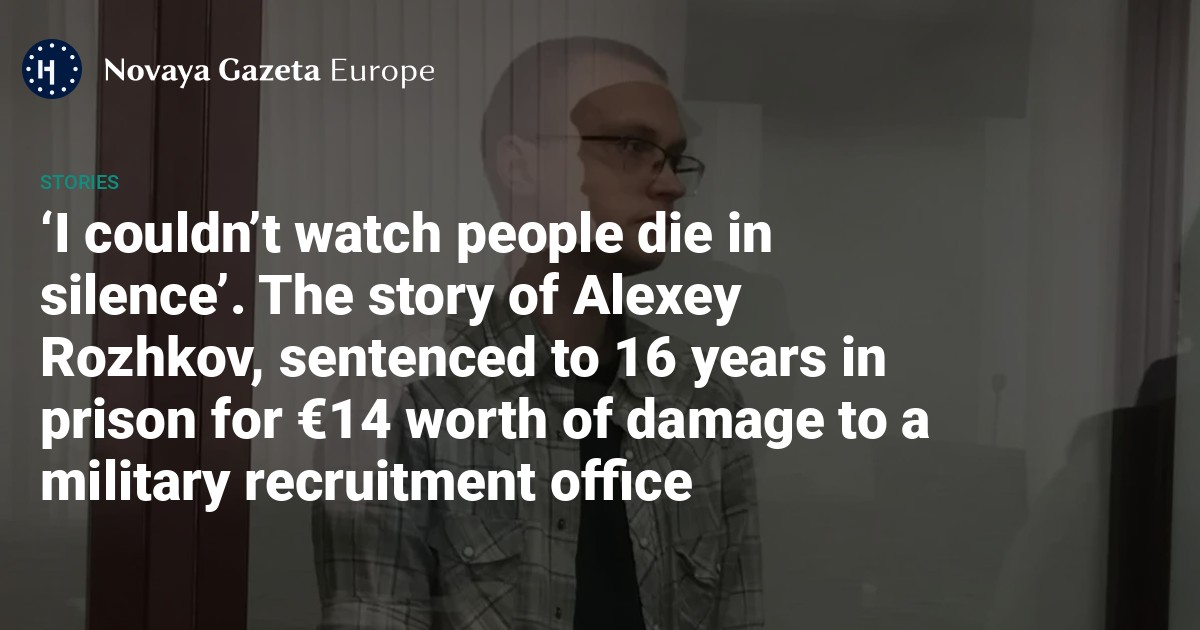
On 11 March 2022, at around 5am, Alexey Rozhkov left his house in the city of Beryozovsky in the Urals. He took three bottles of beer that he had made into Molotov cocktails, and went to the local military recruitment office.
Rozhkov threw all three bottles at the military enlistment office and then painted a peace symbol on the wall. Out on the street, it was still dark and deserted. The lights were off in all the windows, and he thought no one would be inside.
Rozhkov had been drinking the day before. The news of Russia’s full-scale invasion of Ukraine, which had begun just over two weeks earlier, hit him hard. “I just wanted them not to take conscripts away. They’re still children,” he later told his mother.
In that moment, Rozhkov had no idea that over the next three years, he would spend six months in pretrial detention, escape to Kyrgyzstan, be kidnapped by Russian intelligence officers, taken to Russia, and sentenced to 16 years in prison.
Security forces detained Rozhkov the day of the incident. After his arrest, Rozhkov was accused of attempted murder as authorities alleged that he wanted to kill the security guard who was in the building at the time of the incident. However, this charge was dropped due to inconsistencies in the case and in September 2022, he faced only one relatively minor charge, destruction of property, and was released on the condition that he did not leave the country.
“I’ve decided to leave the country rather than spend 15 years in prison.”
However, Rozhkov quickly realised that he could be facing additional charges and a long prison term, and decided to go on the run.
Prior to his arrest, Rozhkov played in a small rock band. After he fled Russia with the help of human rights activists, he warned the group’s supporters on its VK page that it might be a while before they released new music. “I’ve decided to leave the country rather than spend 15 years in prison,” he wrote from Bishkek, the capital of Kyrgyzstan, once he thought he was safe.
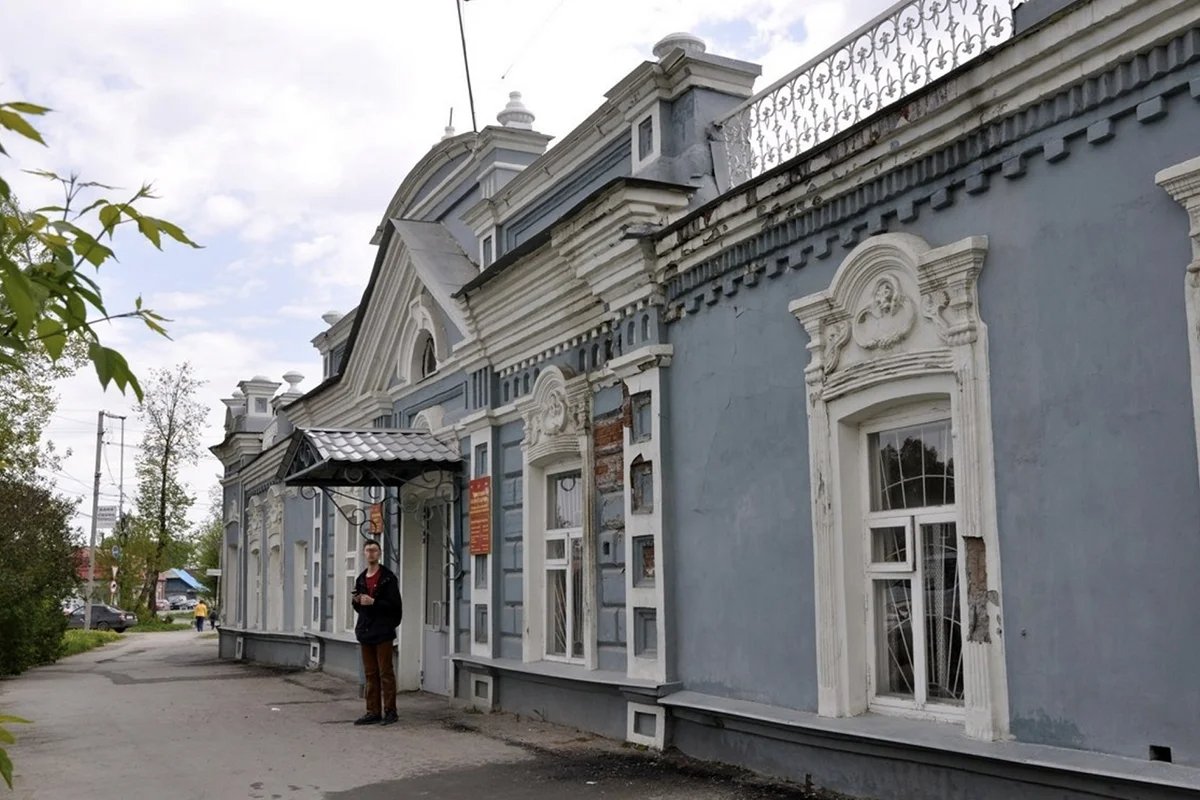
The military enlistment office in Beryozovsky. Photo: 2gis.ru
Rozhkov had planned to stay in Bishkek for several months while arranging to get a humanitarian visa which would allow him to relocate to a safer country, as Kyrgyzstan’s police were known to cooperate with the Russian security services.
Rozhkov had good reason to take security seriously. In Bishkek, he spent a lot of time with his friend Denis*, who recalls that Rozhkov was often followed. “Surveillance was constant. Someone was filming us on their phone the whole time,” he said.
Despite his precarious position, Rozhkov decided he wanted to make his story known, and spoke with journalists on several occasions. In one interview with the Khodorkovsky Live YouTube channel, Rozhkov likened Putin’s “special military operation” to “fascism” and said that authorities were aiming to “exterminate Ukrainian citizens”, leaving him no choice but to “do something”.
Two years later, he would be sentenced on two additional charges of spreading “false information” about the Russian army and “justifying terrorism” for speaking out in interviews.
On 30 May 2023, Rozhkov was detained by Kyrgyz police and handed over to Russian security forces.
According to Rozhkov, who detailed the abduction in court in 2025, he was in his room when plainclothes security forces entered, took his passport, phone and laptop, and convinced him under false pretences to hand over the passwords for his devices. He was then taken to a police station, where he was told “A lawyer won’t help you anyway,” when he requested one.
Rozhkov was then taken to the airport and while awaiting departure, was hit on the head and legs by his detaining officers. Rozhkov was then led through the airport and escorted onto a plane without proper identification or registration.
Two plainclothes officers were already waiting for him on the airplane and after landing in Russia, a Federal Security Service (FSB) officer handcuffed him and took him back to Beryozovsky.
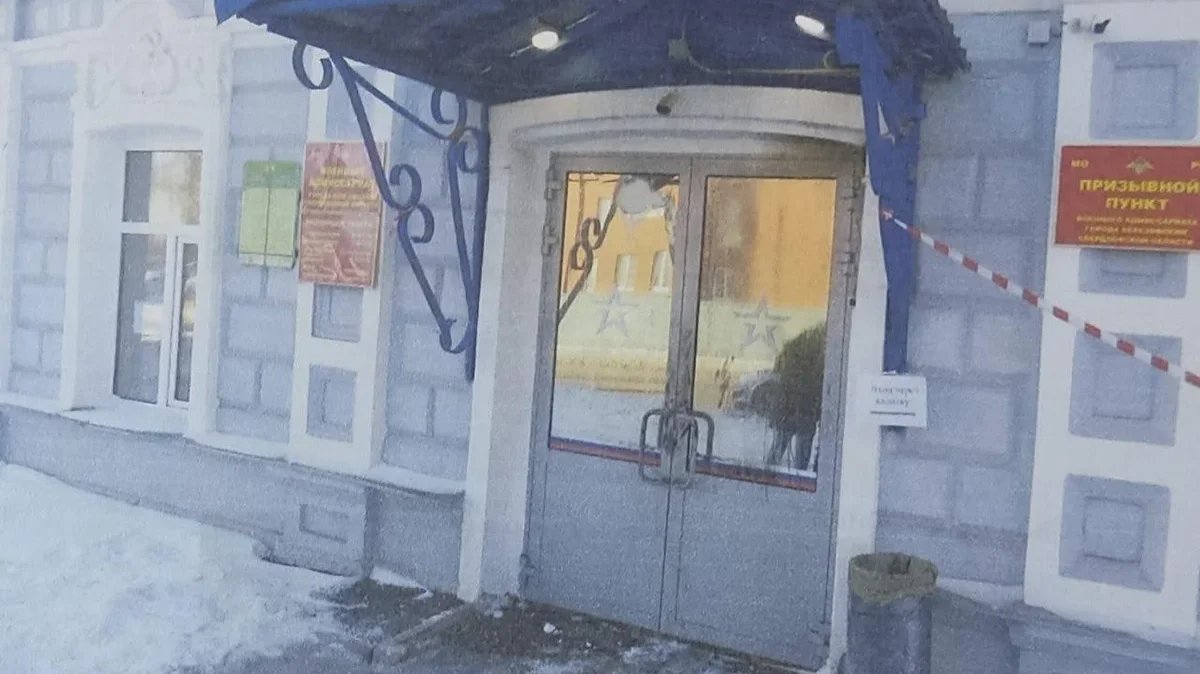
The burnt door to the military enlistment office. Photo: case files
At the local FSB office in Beryozovsky, Rozhkov was told to confess and sign a document stating that he had not been physically harmed or otherwise pressured. When he refused, he was escorted out of the office where an operative who had abducted him from Kyrgyzstan was waiting. A bag was then put over his head and he was subjected to torture with electric shocks.
During the trial, Rozhkov stated that officers used a stun gun on his legs and back to shock him while threatening to “kill and rape” him until he confessed “to cooperating with Ukrainian special services”.
Ilya Melkov, a human rights activist who works for Solidarity Zone, an initiative which offers support for people arrested for anti-war activities, oversaw Rozhkov’s case. While Melkov is unsure “how Russian security forces could carry out such an operation in Kyrgyzstan”, he is sure that it “cannot be explained legally”.
Rozhkov appears to have been taken from Kyrgyzstan without any formal extradition request, and Melkov reported that he had not seen “a single document confirming the detention”. In fact, none of the case materials indicate that Rozhkov was forcibly taken out of Kyrgyzstan.
After Rozhkov’s illegal extradition and re-incarceration, the prosecution decided to up the charges, from damage to property to an act of terrorism. Almost simultaneously, Rozhkov was charged with “justifying terrorism”, while the third charge, for spreading “false information” about the Russian army, was added later, after authorities analysed his interviews and social media posts.
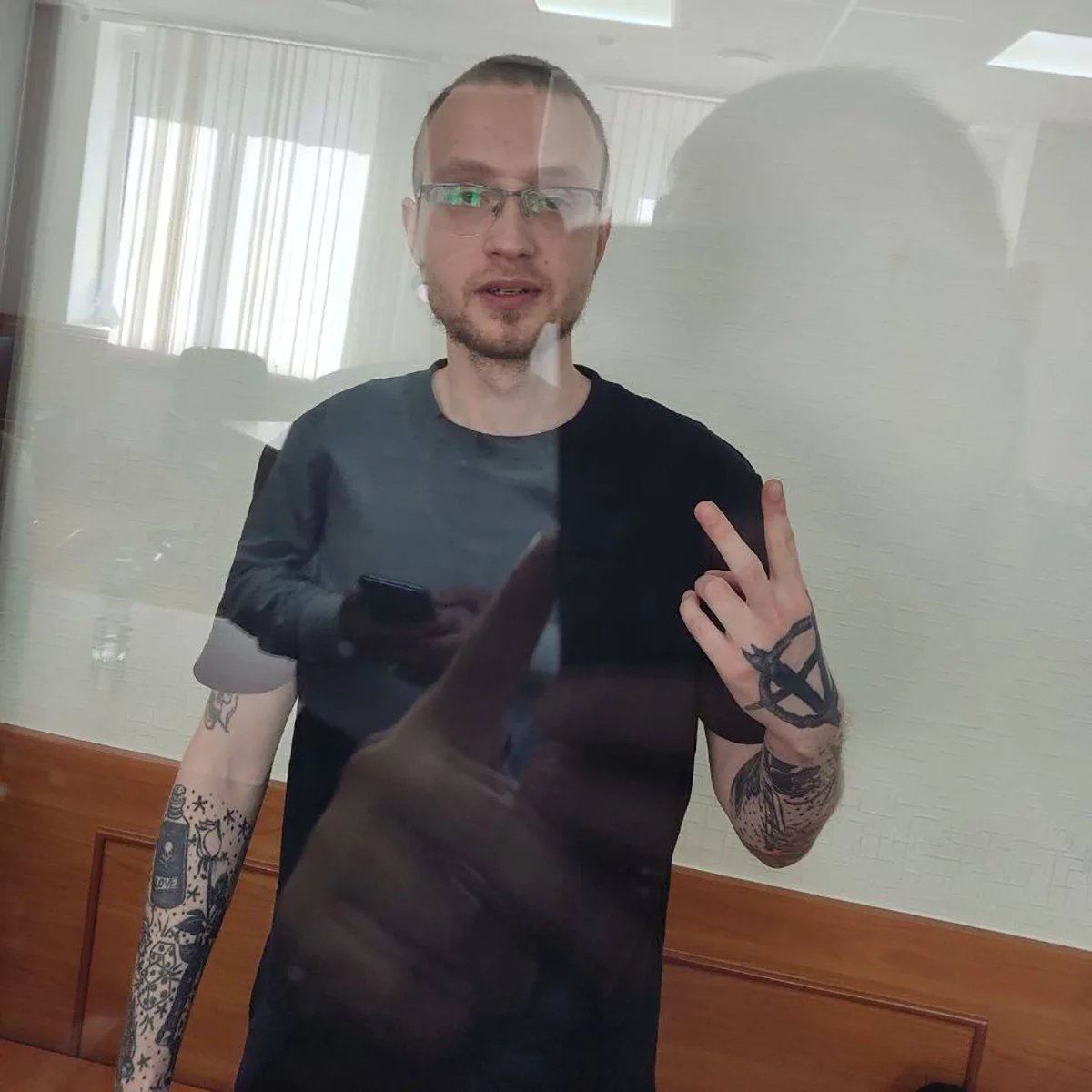
Alexey Rozhkov in court. Photo: Solidarity Zone
Pictures used by the prosecution show a beer bottle which Rozhkov allegedly used to concoct the Molotov cocktail, a red hat fashioned into a balaclava, incendiary mixtures, a lighter, evidence of the damaged door, and the sum total of the damage, which came to less than 1,300 rubles (€14).
“My hooligan efforts to draw attention to people’s suffering has nothing to do with terrorism.”
On 19 May, Rozhkov gave his final statement in court, saying: “Terrorist activity includes murder and intimidation. My hooligan efforts to draw attention to people’s suffering has nothing to do with terrorism… I did not want anyone to get hurt. I was not recruited by anyone. I committed an anti-war protest in which no one should have been hurt.”
The next day, the court sentenced Rozhkov to 16 years in prison — a year longer than he had predicted as he fled Russia.
Rozhkov’s mother, Yelena, did not miss a single court session. While she does not support what her son did, she is sure that he did not intend to harm anyone. As Yelena sees it, all Rozhkov did was “act according to conscience”, as she had raised him to.
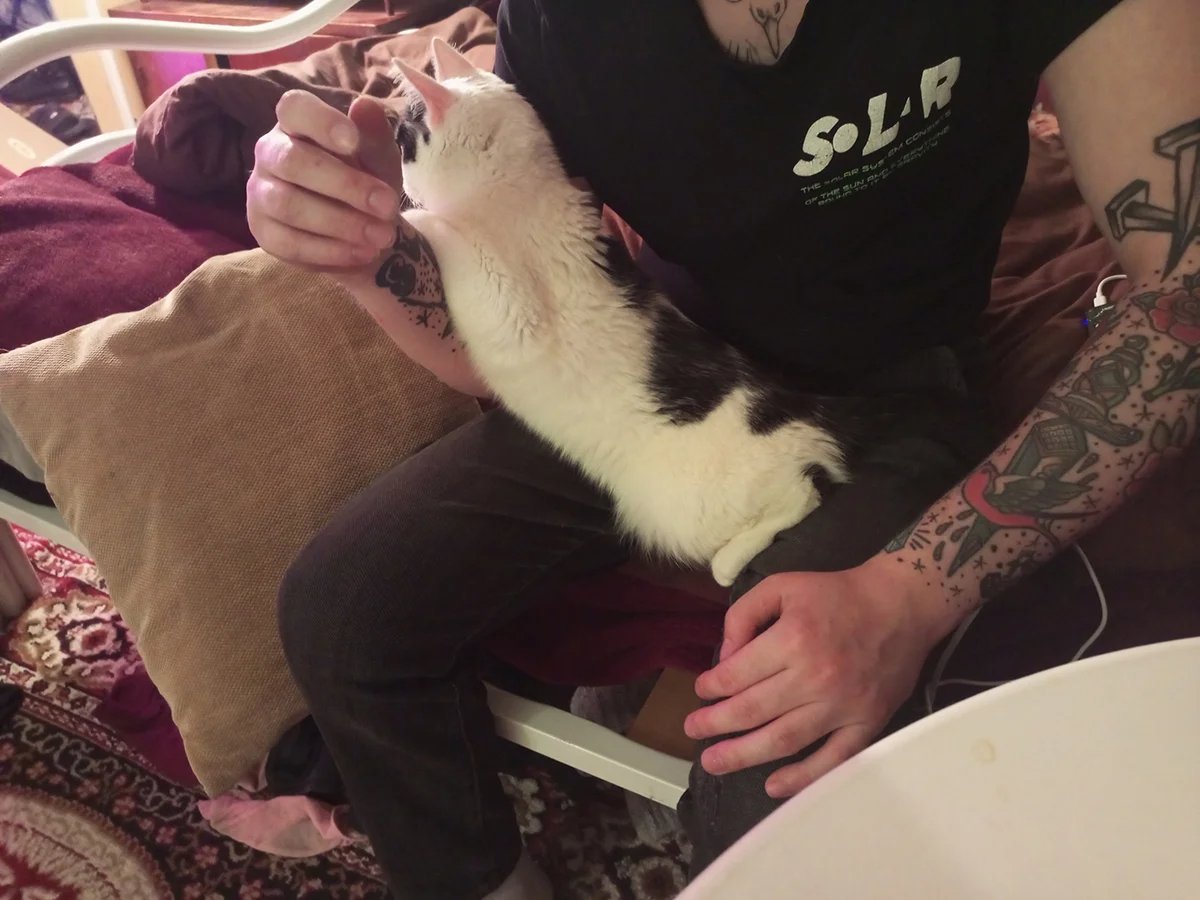
Alexey Rozhkov and Chipa the cat. Photo: Rozhkov’s VK page
According to Yelena, Rozhkov “behaved well” throughout the trial, showing “neither weakness nor panic” despite prosecutors calling him a terrorist. While he admitted that he had broken the law, Rozhkov maintained that he “could not watch people die in silence”, Yelena recalled.
The most difficult moment for Yelena was her son’s sentencing, she recalls. “I was frozen. But he called me afterwards and said, ‘Mum, thank you for not crying’”.
Rozhkov’s friend Maria sometimes writes to him in jail. According to Maria, Rozhkov got a kitten in prison and named him Chipa, in honour of the cat he had back home. However, in another letter, Rozhkov hinted that Chipa was no longer in the prison.
Rozhkov writes sparingly about his everyday life, choosing to focus on the books he reads or the rare parcel that he receives.
Another friend, Nina*, says that Rozhkov is not afraid of prison, but does fear isolation. She says the letters he receives keeps his connection to the outside world alive, so that, despite everything, he does not feel alone.
*Names have been changed.
The Russian government has banned independent media. We were forced to leave our country in order to keep doing our job, telling our readers about what is going on Russia, Ukraine and Europe.
We will continue fighting against warfare and dictatorship. We believe that freedom of speech is the most efficient antidote against tyranny. Support us financially to help us fight for peace and freedom.
By clicking the Support button, you agree to the processing of your personal data.
To cancel a regular donation, please write to [email protected]
VPNovaya
Help Russians and Belarusians Access the Truth
